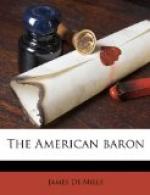“You needn’t bind these prisoners,” said Girasole, grimly; “I know a better way to secure them.”
“In the name of God,” cried the priest, “I implore you not to shed innocent blood!”
“Pooh!” said Girasole.
“This lady is innocent; you will at least spare her!”
“She shall die first!” said Girasole, in a fury, and reached out his hand to grasp Ethel. The priest flung himself forward between the two. Girasole dashed him aside.
“Give us time to pray, for God’s sake—one moment to pray!”
“Not a moment!” cried Girasole, grasping at Ethel.
Ethel gave a loud shriek and started away in horror. Girasole sprang after her. The four men turned to seize her. With a wild and frantic energy, inspired by the deadly terror that was in her heart, she bounded away toward the grave.
CHAPTER XXXV.
BURIED ALIVE.
Hawbury last vanished from the scene to a place which is but seldom resorted to by a living man. Once inside of his terrible retreat he became a prey to feelings of the most varied and harrowing character, in the midst of which there was a suspense, twofold, agonizing, and intolerable. First of all, his suspense was for Ethel, and then for himself. In that narrow and restricted retreat his senses soon became sharpened to an unusual degree of acuteness. Every touch against it communicated itself to his frame, as though the wood of his inclosure had become part of himself; and every sound intensified itself to an extraordinary degree of distinctness, as though the temporary loss of vision had been compensated for by an exaggeration of the sense of hearing. This was particularly the case as the priest drove in the screws. He heard the shuffle on the stairs, the whisper to Ethel, her retreat, and the ascending footsteps; while at the same time he was aware of the unalterable coolness of the priest, who kept calmly at his work until the very last moment. The screws seemed to enter his own frame, and the slight noise which was made, inaudible as it was to others, to him seemed loud enough to rouse all in the house.
Then he felt himself raised and carried down stairs. Fortunately he had got in with his feet toward the door, and as that end was carried out first, his descent of the stairs was not attended with the inconvenience which he might have felt had it been taken down in an opposite direction.
One fact gave him very great relief, for he had feared that his breathing would be difficult. Thanks, however, to the precautions of the priest, he felt no difficulty at all in that respect. The little bits of wood which prevented the lid from resting close to the coffin formed apertures which freely admitted all the air that was necessary.
He was borne on thus from the house toward the grave, and heard the voice of the priest from time to time, and rightly supposed that the remarks of the priest were addressed not so much to the brigands as to himself, so as to let him know that he was not deserted. The journey to the grave was accomplished without any inconvenience, and the coffin was at length put upon the ground.




